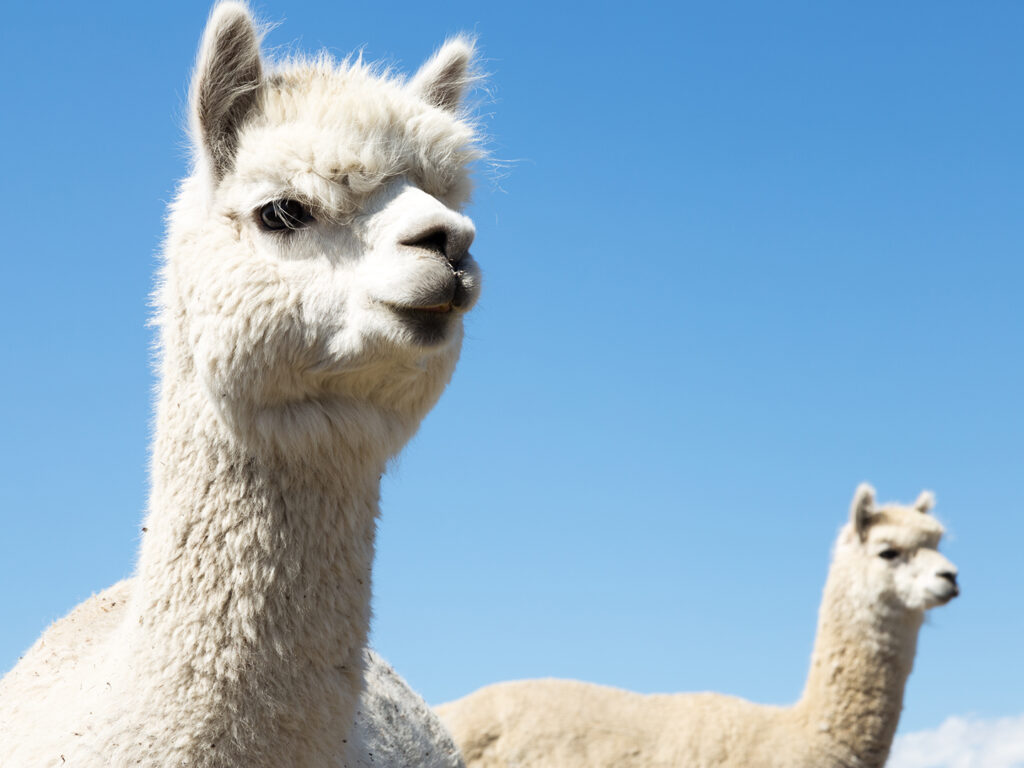First-Time Alpaca Ownership: What To Consider Before Buying

Cute faces, fluffy bodies, and calm attitudes are among the reasons alpacas have gained popularity as fun and unique pets.
“Many people choose to have alpacas as an alternative livestock animal,” explained Dr. Dusty Nagy, a clinical associate professor at the Texas A&M School of Veterinary Medicine & Biomedical Sciences. “They are relatively small and respect fences, which makes them easier to contain than many of our more traditional livestock species.”
Before beginning the alpaca ownership journey, however, owners should ensure they will be successful in caring for their alpacas by securing veterinary care and enlisting their veterinarian’s help in identifying healthy alpacas to buy.
Securing Veterinary Care
Veterinary care is essential to maintaining a pet’s health and resolving any emergencies that may arise. By finding a veterinarian before buying an alpaca, owners can guarantee they will be able to meet their alpaca’s health needs.
“Securing care for some species can be extremely difficult; not every large animal veterinarian will see alpacas, which is why owners should have a veterinarian before purchasing one,” Nagy said. “Having a veterinarian can be beneficial during the purchase as well, as they can provide appropriate confirmation that an alpaca is free from disease.”
Because gastrointestinal parasites are common in alpacas and can be deadly, Nagy recommends having your veterinarian perform a fecal parasite exam to be sure that there is a low amount of parasite eggs.
“Unless animals are housed in a dry lot, it is unrealistic to expect them to have no eggs in the feces on a consistent basis, so the test ensures that the level of parasite eggs is low enough for animals to remain healthy,” Nagy explained.
Benefits Of Owning Two Adult Alpacas
In addition to buying physically healthy alpacas, potential owners should avoid purchasing only one alpaca because alpacas are social herd animals by nature and tend to remain emotionally and physically healthy as part of a herd.
“It is not a guarantee that a single alpaca will bond with other animals that they are housed with, and not having a herd dynamic may leave them disengaged from the other alpacas,” Nagy said. “A herd also provides nurturing between alpacas and safety from predators. The lack of both can be stressful, and chronic stress can lead to illness.”
To foster a herd dynamic, Nagy encourages owners to purchase at least two alpacas that know and seem to like each other.
“The easiest way to find two animals that like each other is to get them at the same time from one breeder,” Nagy said. “Bonded animals typically stick close to one another within a herd setting. Most people who are observant of their herds know who these animals are and can guide people before a purchase.”
Potential owners may be interested in raising two young alpacas, specifically, but Nagy points out that raising young alpacas without an adult herd can result in emotionally unhealthy adults.
“Juveniles can develop significant behavioral abnormalities, such as aggression, when raised without an adult herd,” Nagy said. “For this reason, I recommend those new to alpaca ownership purchase only adult alpacas instead of young ones that need to be raised.”
Ultimately, prospective alpaca owners should not let an alpaca’s inviting appearance detract from their needs. Prioritizing their veterinary care and providing a herd is still essential to keeping alpacas healthy, allowing you to enjoy their wonderful companionship.
Pet Talk is a service of the School of Veterinary Medicine & Biomedical Sciences, Texas A&M University. Stories can be viewed on the web at vetmed.tamu.edu/news/pet-talk. Suggestions for future topics may be directed to vmbs-editor@tamu.edu.


